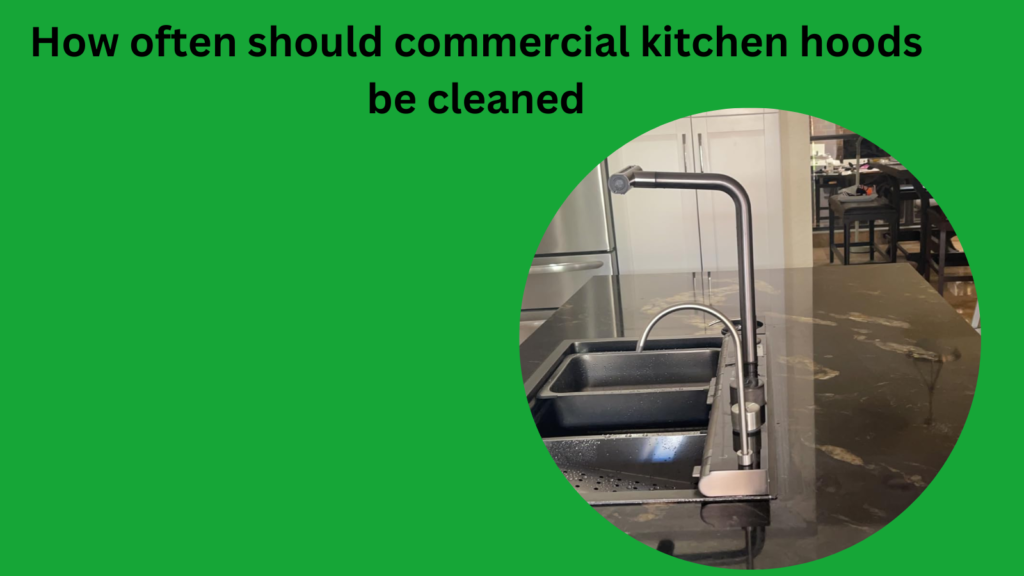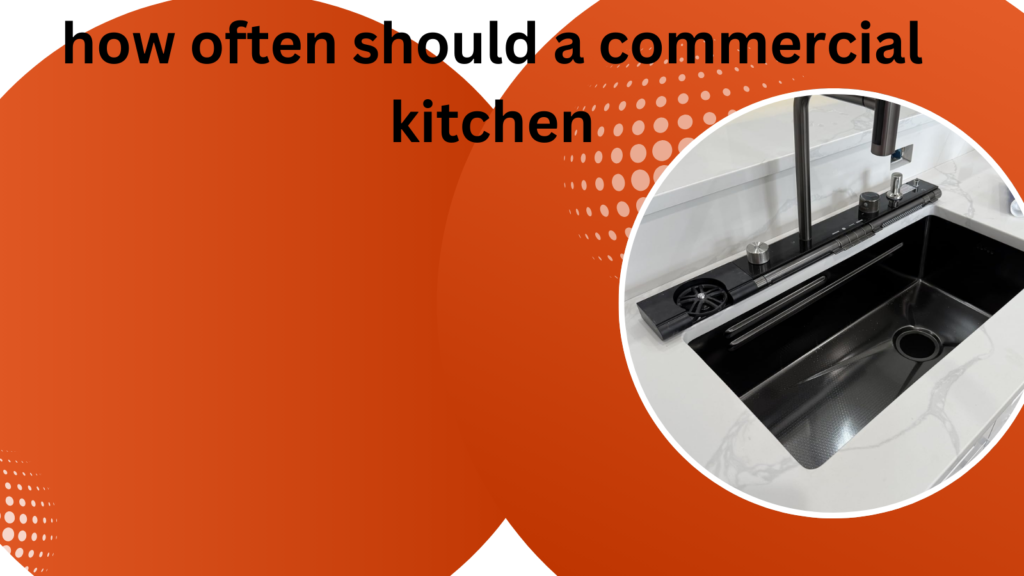Ever walked into a kitchen and caught a whiff of lingering grease? That’s a sign the kitchen hood might be overdue for a cleaning. How often should commercial kitchen hoods be cleaned? It’s a question every restaurant owner, chef, and kitchen manager needs to know to keep their space safe and compliant. As someone who’s seen the damage built-up grease can cause—including a near kitchen fire—I can’t stress enough how vital regular hood cleaning is. In this guide, I’ll break down how often you should clean your kitchen hood, why it matters, and how to do it right.
Why Cleaning Commercial Kitchen Hoods Is Essential
If you’ve ever worked in a busy kitchen, you know how quickly grease builds up. One minute, everything looks spotless, and the next, you’re staring at a thick layer of grime clinging to your hood. Cleaning your commercial kitchen hood isn’t just about keeping things tidy—it’s a matter of safety, efficiency, and compliance. Let’s break it down.
Preventing Fire Hazards and Ensuring Safety
Grease is fuel waiting for a spark. When it collects inside your hood, ductwork, and exhaust fan, all it takes is a single flare-up to start a dangerous fire. Most restaurant fires start because of dirty kitchen hoods. That’s why regular cleaning isn’t optional—it’s a lifesaving habit.
Maintaining Air Quality and Ventilation Efficiency
Ever felt like you were cooking in a sauna? A clogged hood traps heat, smoke, and odors, making your kitchen unbearable. A clean exhaust system keeps the air fresh, removes grease-laden vapors, and helps maintain proper airflow. Your staff breathes easier, and your customers don’t leave smelling like fried food.

Complying with Health and Fire Safety Regulations
Health inspectors don’t just glance at your food storage—they check your hood system, too. Failing to clean your kitchen hood can lead to fines, shutdowns, or even the loss of your business license. Fire codes, like the NFPA 96 standard, require regular maintenance to keep your restaurant compliant.
Extending the Lifespan of Kitchen Equipment
Think of your kitchen hood like a car engine—neglecting maintenance leads to breakdowns. A grease-clogged system makes your exhaust fan work overtime, leading to expensive repairs or replacements. Regular cleaning keeps your equipment running smoothly and saves you money in the long run.
Skipping hood cleaning isn’t worth the risk. It protects your kitchen, your employees, and your business. Up next, let’s talk about how often you should schedule a cleaning based on your kitchen’s workload.
How Often Should a Commercial Kitchen Hood Be Cleaned?
If you’ve ever worked in a busy restaurant kitchen, you know how fast grease builds up. One day, your hood looks fine, and the next, it’s coated in a sticky layer of grime. But how often should you clean it? The answer depends on how much you’re cooking and what kind of food you’re making.
General Guidelines Based on Usage
- High-Volume Kitchens (Fast Food, 24/7 Restaurants): Monthly
If your kitchen never slows down, neither does grease buildup. Fast food joints, diners, and 24/7 restaurants pump out fried, grilled, and greasy foods all day. The more grease, the bigger the fire risk. That’s why these kitchens need a deep cleaning at least once a month to stay safe and compliant. - Moderate-Use Kitchens (Casual Dining, Hotel Restaurants): Quarterly
If your kitchen isn’t running around the clock but still sees steady traffic, a quarterly cleaning is the way to go. Think hotel restaurants, sit-down diners, and catering businesses. These places still produce grease, but not at the same level as a fast-food chain. A professional cleaning every three months keeps the system running smoothly. - Low-Volume Kitchens (Churches, Seasonal Businesses): Semi-Annually to Annually
If your kitchen is only used a few times a week or seasonally—like a church hall or a summer camp cafeteria—you might get away with cleaning every six months to a year. But don’t assume you’re in the clear just because you cook less! Even small amounts of grease can build up over time and become a fire hazard.
Industry Standards and Regulations
The National Fire Protection Association (NFPA 96) has clear rules on hood cleaning. Their guidelines are based on fire safety research, and most local fire departments follow them closely. Ignoring these standards can lead to hefty fines—or worse, a kitchen fire.
Local health departments also have their own rules. Some cities require proof of professional cleanings at specific intervals. If an inspector walks in and sees a grease-covered hood, you could face penalties or even temporary shutdowns. Bottom line? Stay ahead of the rules, and don’t wait for an inspector to remind you!
Factors That Influence Cleaning Frequency
Ever walked into a kitchen where the air feels thick and greasy? That’s a sign that the hood system isn’t getting cleaned often enough. But how often should it be cleaned? Well, it’s not a one-size-fits-all answer. The frequency depends on several factors—let’s break them down.
Type of Food Being Cooked: Greasy vs. Minimal Grease
Picture a kitchen frying up burgers, bacon, and wings all day. Now compare that to a café that mostly serves salads and sandwiches. Big difference, right? Greasy foods release more airborne grease, which sticks to your hood, ducts, and fans. The more grease, the more fire risk. If your menu is packed with fried and grilled items, you’ll need frequent cleanings—probably monthly. If you’re mostly steaming or baking, you can space it out a bit more.

Cooking Methods: Grilling, Frying, Steaming—Which One’s the Messiest?
Ever noticed how your stovetop looks after deep-frying? Now imagine that grease floating up into your exhaust system. Frying and grilling generate heavy grease buildup, while boiling and steaming don’t. So, if your kitchen is all about crispy fried chicken and sizzling steaks, you’ll need more frequent hood cleanings. If you’re steaming veggies or making soups, grease accumulation will be much slower.
Volume of Cooking and Operational Hours
Think about how long your kitchen stays open. A 24/7 diner is constantly pumping out meals, meaning grease accumulates fast. Compare that to a school cafeteria that only runs during lunch hours—there’s a big difference in buildup! The more meals you serve, the more often you need to clean your hood.
Type of Exhaust System and Filters in Place
Not all kitchen hoods are created equal. Some high-efficiency systems have better grease filters that slow down buildup, while older or poorly maintained systems collect grime faster. If your filters are clogged, grease bypasses them and gets stuck in the ducts—bad news for fire safety. Keeping filters clean helps extend the time between deep cleanings, but it doesn’t replace them!
How to Properly Clean a Commercial Kitchen Hood
Let’s be real—cleaning a commercial kitchen hood isn’t exactly the most exciting task. But if you’ve ever walked into a kitchen with sticky, grease-covered walls and that unmistakable smoky smell, you know why it’s important. A clean hood keeps your kitchen safe, efficient, and, let’s be honest, way more pleasant to work in.
So, how do you get the job done right? Let’s break it down.
DIY Cleaning vs. Professional Services
You could try cleaning your kitchen hood yourself, but it’s not as simple as wiping down a countertop. Grease builds up inside the ducts, fan, and exhaust system—places you can’t easily reach. If you don’t clean it thoroughly, you’re just asking for trouble (and by trouble, I mean a grease fire).
That’s why most restaurant owners leave deep cleaning to professionals. Certified hood cleaning services have the right tools, industrial-strength degreasers, and training to get every inch of your system spotless. Plus, they provide proof of cleaning, which keeps health inspectors happy.
That said, you should still do regular maintenance between professional cleanings. Here’s how.
Steps for Routine Maintenance
1. Clean Grease Filters Regularly
Your grease filters are like the frontline soldiers in the battle against grease buildup. They trap grease before it gets sucked into the ducts. But if they’re clogged, your whole system suffers.
- How often? At least once a week—more often if you fry a lot.
- How to clean? Soak them in hot, soapy water or run them through the dishwasher if they’re metal.
Skipping this step? You’ll notice your kitchen getting smokier and hotter, which means your ventilation isn’t working as it should.
2. Wipe Down Exterior Surfaces
If you’ve ever leaned against a counter and felt that sticky film on your sleeve, you know how quickly grease spreads. The exterior of your hood is no different.
- How often? Daily. A quick wipe-down prevents grease from piling up.
- What to use? A degreaser or a mix of warm water and dish soap.
It only takes a few minutes, but it keeps your kitchen looking clean and prevents long-term grime buildup.
3. Schedule Deep Cleaning for Ductwork and Exhaust Fans
This is where the real mess hides. Grease builds up inside the ductwork and exhaust fan, and if it’s not removed, it can turn into a fire hazard.
- How often? Depends on your kitchen’s workload (monthly, quarterly, or annually).
- Who should do it? A professional hood-cleaning service.
If you hear rattling noises, notice smoke lingering longer than usual, or see grease dripping from the hood, your system is way overdue for a deep clean.
Signs That Your Hood System Needs Immediate Cleaning
How do you know if your hood is crying out for help? Here are some red flags:
🚨 Strong grease smell – If your kitchen constantly smells like old grease, your exhaust system isn’t doing its job.
🚨 Excessive smoke or heat – If smoke isn’t venting out properly, your hood might be clogged.
🚨 Grease dripping from the hood – This is a serious fire hazard. If you see grease pooling or dripping, get it cleaned ASAP.
🚨 Fan making strange noises: A struggling exhaust fan means grease buildup is likely slowing it down.
Choosing the Right Professional Hood Cleaning Service
What to Look for in a Certified Hood Cleaning Company
- Proper Licensing & Certification: Ensure they follow NFPA 96 standards.
- Experience & Reputation: Look for companies with positive customer reviews.
- Insurance Coverage: Protects against any accidental damages.
Questions to Ask Before Hiring
- How long have you been in business?
- Do you provide proof of cleaning for compliance purposes?
- What cleaning methods do you use?
- Can you customize a service plan based on my kitchen’s needs?
Cost Expectations & Service Frequency Plans
Hood cleaning costs vary based on kitchen size, grease buildup, and frequency. Many professional cleaners offer service contracts, which can save money in the long run while ensuring compliance.
FAQs
What Happens If I Don’t Clean My Commercial Kitchen Hood?
You risk fire hazards, poor air quality, health violations, fines, and potential business shutdowns.
Can I Clean the Hood Myself, or Do I Need a Professional?
Routine maintenance like wiping down surfaces and cleaning grease filters can be done in-house, but professional deep cleaning is essential for thorough safety and compliance.
How Do I Know When My Hood Needs Cleaning?
If you notice visible grease, increased smoke, unpleasant odors, or reduced airflow, it’s time for a cleaning.
Are There Penalties for Not Following Hood Cleaning Regulations?
Yes. Non-compliance can result in fines, failed health inspections, fire hazards, and even the revocation of your business license.
What Is the Best Way to Maintain a Kitchen Hood Between Professional Cleanings?
Regularly clean grease filters, wipe down external surfaces, and check airflow to prevent excessive grease accumulation.
Conclusion
Regular commercial kitchen hood cleaning is not just about aesthetics—it’s about safety, compliance, and efficiency. Following recommended cleaning schedules and investing in professional services will keep your kitchen running smoothly while reducing fire risks. Don’t wait for an inspector to remind you—be proactive and keep your kitchen safe. Have questions? Share your thoughts in the comments below!

I’m a writer and culinary expert with over 10 years of experience in the kitchen. As a graduate of the Institute of Culinary Education and a passionate home chef, I created KitchenBreez.com to share my knowledge of kitchen techniques, cooking tips, and the best kitchen gadgets. Whether you’re a seasoned cook or just starting, my goal is to help you make your time in the kitchen more efficient and enjoyable.
